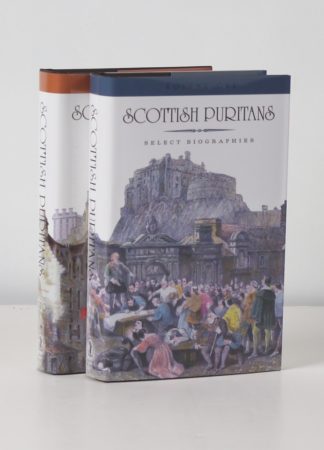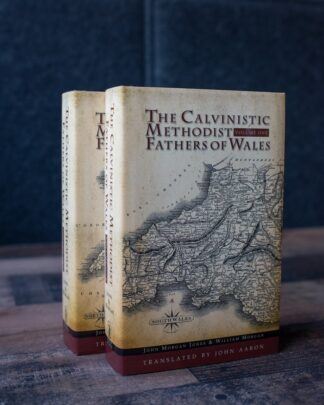Scottish Puritans – A Review by Ben Ramsbottom
The Banner of Truth has published Scottish Puritans: Select Biographies,1 edited by W. K. Tweedie, and when we began to read this set, we expected something similar to the much appreciated Calvinistic Methodist Fathers of Wales,2 We could not have been more mistaken; the two sets are completely different. Yet Scottish Puritans is a real treasury – if rightly understood.
These two volumes are reprints of two books published by The Wodrow Society. From the times of the Scottish Covenanters, there survived many manuscripts, of real value, but never published because of the tumultuous times in which they were written. The Wodrow Society was founded in 1841 to remedy this, and by 1850 twenty-six volumes had been printed.
In Scottish Puritans there is great variety in length, style and content. For instance, there is a very brief life of the eminent David Dickson, but a long autobiography of John Livingstone. The comparatively short life of John Welsh contains things which are seemingly apocryphal. Some of the writings are in such ancient Scots dialect that, despite an excellent glossary, they are difficult to understand – for instance, the extracts from the Records of the Kirk Session of Ayr and the letters of Lady Culross.
‘When published by The Wodrow Society, the Editor claimed that the books would be ‘storehouses and authorities for future biographers and historians’ and so it has proved. Many of the well-known stories are obviously taken from these sources. It certainly is gratifying to read of one writing about Samuel Rutherford, whom he knew well, and one who was present when David Dickson, before he died, exclaimed that he had taken all his bad deeds and good deeds, thrown them into a heap, and fled from them to Christ.
We were very touched by the account of James Fraser of Brea’s imprisonment on the notorious Bass Rock. As he was remanded to prison, he wrote,
But in my darkness was the Lord a light round about me; him they could not shut out from me: for that night did I get a most kindly and comfortable visit from the Lord Jesus, and I had one of the most sweet nights I had for ten years before that. [Volume 2, p. 343]
Two accounts we specially liked.
1. The account of a land-labourer, John Stevenson, written by himself. His minister testified of him that he was the godliest man he ever knew. This account is not only very gracious, but extremely interesting, especially when he writes of his adventures when the Covenanters were hounded day and night by the English soldiers. He writes:
I was made to take joyfully the spoiling of my goods, and with pleasure for his name’s sake wandered in deserts and in mountains, in dens and caves of the earth. I lay four months in the coldest season of the year in a haystack in my father’s garden, and a whole February in the open fields not far from Camragen. One night, when lying in the field near to Carrick-Miln, I was all covered with snow in the morning. [Volume 2, p. 471]
2. The Last Words of Lady Coltness, who died June 8th, 1675, aged 37. Among other things she said:
O free, free love! I look, look, look to this for mercy. I look to thy righteousness, that imputed righteousness. I look to that satisfaction offered at Jerusalem for sinners; thy blood crieth for better things than that of Abel. O blessed imputed righteousness! O blessed satisfaction! I renounce my own righteousness; it is all as rotten rags. Lord, I come unto thee; thou hast said, ‘All that cometh unto me, I will in no wise cast out.’ O, O, O! free love! though one might dare to die for a righteous man, yet our Lord for his enemies. O wonderful love! Lord, thou knowest all things; thou knowest that I love thee. [Volume 2, p. 501]
There is an extremely useful short foreword by the present Publishers, which must be read first – explaining some of the difficulties, e.g. that some parts are hard reading. ‘The uninitiated today, who plunge into Select Biographies, may be bewildered.’ This may not be the best starting point for understanding Scottish church history. Also, very honestly, the Publishers admit that the Covenanters ‘were not models in all things’! They did not understand the principle of toleration. They believed that Scotland was a theocracy, like Old Testament Israel. But they were people of real godliness and grace.
We can endorse what appears on the back cover of Volume 1: ‘one of the great treasures of Scottish Christian literature.’
Notes

Scottish Puritans
2 Volume Set: Select Biographies
price £32.00Description
The Banner of Truth has published Scottish Puritans: Select Biographies,1 edited by W. K. Tweedie, and when we began to read this set, we expected something similar to the much appreciated Calvinistic Methodist Fathers of Wales,2 We could not have been more mistaken; the two sets are completely different. Yet Scottish Puritans is a real […]

The Calvinistic Methodist Fathers of Wales
2 Volume Set
price £40.00Description
The Banner of Truth has published Scottish Puritans: Select Biographies,1 edited by W. K. Tweedie, and when we began to read this set, we expected something similar to the much appreciated Calvinistic Methodist Fathers of Wales,2 We could not have been more mistaken; the two sets are completely different. Yet Scottish Puritans is a real […]
Latest Articles
Finished!: A Message for Easter 28 March 2024
Think about someone being selected and sent to do an especially difficult job. Some major crisis has arisen, or some massive problem needs to be tackled, and it requires the knowledge, the experience, the skill-set, the leadership that they so remarkably possess. It was like that with Jesus. Entrusted to him by God the Father […]
Every Christian a Publisher! 27 February 2024
The following article appeared in Issue 291 of the Banner Magazine, dated December 1987. ‘The Lord gave the word; great was the company of those that published it’ (Psalm 68.11) THE NEED FOR TRUTH I would like to speak to you today about the importance of the use of literature in the church, for evangelism, […]
